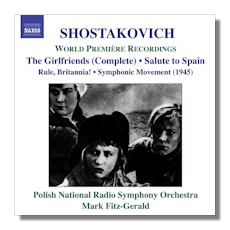
The Internet's Premier Classical Music Source
Related Links
- Shostakovich Reviews
- Latest Reviews
- More Reviews
-
By Composer
-
Collections
DVD & Blu-ray
Books
Concert Reviews
Articles/Interviews
Software
Audio
Search Amazon
Recommended Links
Site News
 CD Review
CD Review
Dmitri Shostakovich

Rarities
- Podrugi (The Girlfriends), Op. 41a 1
- Salute to Spain, Op. 44 2
- Rule, Britannia!, Op. 28 3
- Symphonic Movement (1945)
1 Celia Sheen, theremin
3 Kamil Barczewski, bass
1,2,3 Camerata Silesia/Anna Szostak
Polish National Radio Symphony Orchestra/Mark Fitz-Gerald
Naxos 8.572138
This Shostakovich disc is easily one of the most unusual recordings I have ever encountered. It contains the première performances of four works: a film score, The Girlfriends; two scores for the stage, Rule Britannia! and Salute to Spain; and a fragmentary work originally intended to serve as the first movement of the Ninth Symphony. Intriguing stuff, you say! Indeed! But what you get is a mixture of the compelling, the curious and the routine. Mind you, Shostakovich didn't intend this music to be performed in concert; rather, he meant it to accompany the action in a film. Upon seeing the film, I would likely declare this a pretty successful venture.
The film, The Girlfriends (1934; released in 1936), is about three girlfriends who grow up to become nurses and serve together during the Russian Civil War (1917-23). Most of the score's 23 numbers were reconstructed by conductor Mark Fitz-Gerald by ear from the soundtrack of the film. Tracks 2-4, 8, 16, 19 and 23 were exceptions, since copies of their music survived. The music is mostly chamber-like in scoring, with the first track, for string quartet, comprised of music from the second movement of the First String Quartet. This cue was added to the film in the 1960s, when it was restored. The second track is also for string quartet and is somber in mood, like the first. Trumpet and piano are added in the next two numbers, bringing somewhat brighter colors.
There are several choral movements, featuring popular or Revolutionary songs (The Keys to Happiness; Tormented by a Lack of Freedom). The scoring here is a cappella and the mood rather bleak. There are glitzy trumpet fanfares mixed in, but the overall tenor of the music is solemn, with mostly delicate scoring. Some of the music, especially that involving piano and trumpet (tracks 3, 4, 8, 19), are reminiscent of the First Piano Concerto (1933), and some of the brighter music recalls moments from Shostakovich's early ballets – The Golden Age, The Bolt and The Limpid Brook. Shostakovich uses the theremin in track 14, Internationale. This is the eerie instrument used in such science fiction classics as The Day the Earth Stood Still. Here it is used unaccompanied and sounds a bit dated, but also as if Shostakovich is, at times, playing around with the instrument.
All in all, this is an interesting but not great score. Rule Britannia! (1931) and Salute to Spain (1936) are also of musical interest. Both were written for plays with Communist-inspired themes, and both are fairly light works. The latter features a healthy measure of trumpet fanfares and bombast, but is still not to be dismissed.
The one truly compelling composition here is the Symphonic Movement (1945). Its scoring is pure Shostakovich, which is not always the case with the other works on this CD. But the music comes across as more of an overture than a movement of a symphony, which is probably why Shostakovich set it aside in favor of other music for his Ninth Symphony. Here the mood is epic and tense, much darker than anything in the Ninth. Clearly, Shostakovich hadn't purged the war and its costly toll from his mind when he wrote this work. Some of the scoring recalls the Eight Symphony, especially in the writing for the oboe. Unfortunately, the work ends abruptly (at under seven minutes!), leaving you to wonder where it might have been headed: the music is building toward some grand climax, when it suddenly breaks off.
The performances are strong throughout, with conductor Fitz-Gerald drawing spirited playing from the Polish National Radio Symphony and the other forces here. The sound is vivid, and the notes by Fitz-Gerald, John Riley, David Fanning and Peter Bromley are well-researched and enlightening. Recommended.
Copyright © 2009, Robert Cummings




















